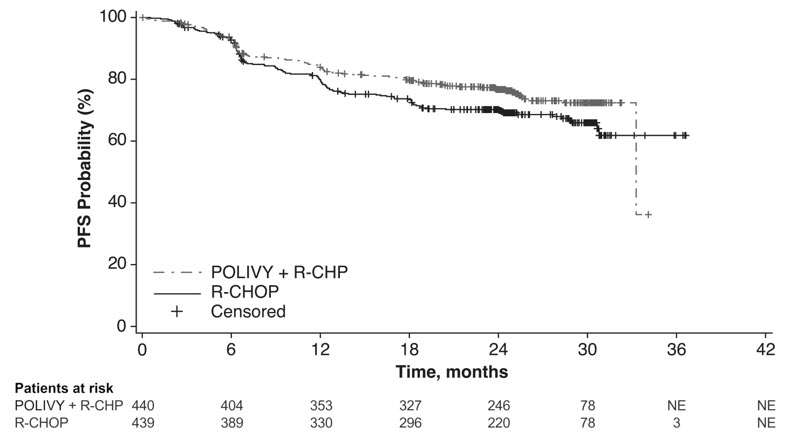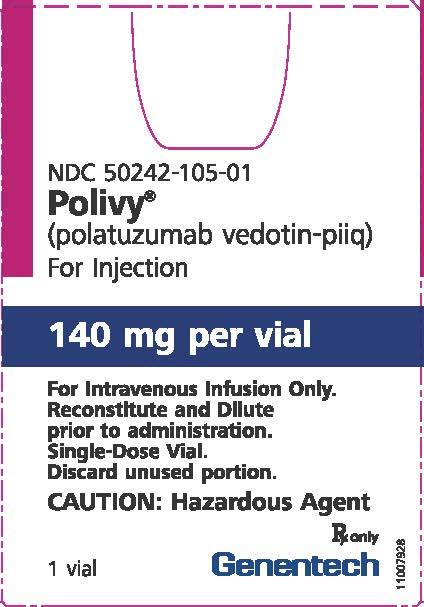Polivy
Generic name: polatuzumab vedotin
Drug class: Miscellaneous antineoplastics
Medically reviewed by A Ras MD.
What is Polivy used for?
Polivy is a prescription medicine that is used to treat a type of lymphoma.
Description
Polatuzumab vedotin-piiq is a CD79b-directed antibody-drug conjugate (ADC) consisting of three components: 1) the humanized immunoglobulin G1 (IgG1) monoclonal antibody specific for human CD79b; 2) the small molecule anti-mitotic agent MMAE; and 3) a protease-cleavable linker maleimidocaproyl-valine-citrulline-p-aminobenzyloxycarbonyl (mc-vc-PAB) that covalently attaches MMAE to the polatuzumab antibody.

Polatuzumab vedotin-piiq has an approximate molecular weight of 150 kDa. An average of 3.5 molecules of MMAE are attached to each antibody molecule. Polatuzumab vedotin-piiq is produced by chemical conjugation of the antibody and small molecule components. The antibody is produced by mammalian (Chinese hamster ovary) cells, and the small molecule components are produced by chemical synthesis.
POLIVY (polatuzumab vedotin-piiq) for injection is supplied as a sterile, white to grayish-white, preservative-free, lyophilized powder, which has a cake-like appearance, for intravenous infusion after reconstitution and dilution.
Each single-dose 30 mg POLIVY vial delivers 30 mg of polatuzumab vedotin-piiq, polysorbate-20 (1.8 mg), sodium hydroxide (0.82 mg), succinic acid (1.77 mg), and sucrose (62 mg). After reconstitution with 1.8 mL of Sterile Water for Injection, USP, the final concentration is 20 mg/mL with a pH of approximately 5.3.
Each single-dose 140 mg POLIVY vial delivers 140 mg of polatuzumab vedotin-piiq, polysorbate-20 (8.4 mg), sodium hydroxide (3.80 mg), succinic acid (8.27 mg), and sucrose (288 mg). After reconstitution with 7.2 mL of Sterile Water for Injection, USP, the final concentration is 20 mg/mL with a pH of approximately 5.3.
The POLIVY vial stoppers are not made with natural rubber latex.
Mechanism of Action
Polatuzumab vedotin-piiq is a CD79b-directed antibody-drug conjugate with activity against dividing B cells. The small molecule, MMAE, is an anti-mitotic agent covalently attached to the antibody via a cleavable linker. The monoclonal antibody binds to CD79b, a B-cell specific surface protein, which is a component of the B-cell receptor. Upon binding CD79b, polatuzumab vedotin-piiq is internalized, and the linker is cleaved by lysosomal proteases to enable intracellular delivery of MMAE. MMAE binds to microtubules and kills dividing cells by inhibiting cell division and inducing apoptosis.
Before taking Polivy, tell your doctor:
- If you are allergic to Polivy; any part of this medicine; or any other drugs, foods, or substances. Tell your doctor about the allergy and what signs you had.
- If you have liver disease.
- If you are breast-feeding. Do not breast-feed while you take Polivy or for 2 months after your last dose.
This is not a list of all drugs or health problems that interact with this medicine.
Tell your doctor and pharmacist about all of your drugs (prescription or OTC, natural products, vitamins) and health problems. You must check to make sure that it is safe for you to take Polivy with all of your drugs and health problems. Do not start, stop, or change the dose of any drug without checking with your doctor.
What are some things I need to know or do while I take Polivy?
- Tell all of your health care providers that you take Polivy. This includes your doctors, nurses, pharmacists, and dentists.
- Have blood work checked as you have been told by the doctor. Talk with the doctor.
- You may have more of a chance of getting an infection. Wash hands often. Stay away from people with infections, colds, or flu. Some infections have been very bad and even deadly.
- You may bleed more easily. Be careful and avoid injury. Use a soft toothbrush and an electric razor.
- Infusion reactions have happened with Polivy. These have happened on the same day as the infusion. Tell your doctor if you have any bad effects during or after the infusion.
- Patients with cancer who take Polivy may be at a greater risk of getting a severe health problem called tumor lysis syndrome (TLS).This may lead to death. Call your doctor right away if you have a fast or abnormal heartbeat; any passing out; trouble passing urine; muscle weakness or cramps; upset stomach, throwing up, diarrhea, or not able to eat; or feel sluggish.
- If you are 65 or older, use Polivy with care. You could have more side effects.
- This medicine may affect being able to father a child. Talk with the doctor.
- Men with a partner who may get pregnant must use birth control while taking Polivy and for some time after the last dose. Ask your doctor how long to use birth control. If your partner gets pregnant, call the doctor right away.
- This medicine may cause harm to an unborn baby. A pregnancy test will be done before you start Polivy to show that you are NOT pregnant.
- Women must use birth control while taking Polivy and for some time after the last dose. Ask your doctor how long to use birth control. If you get pregnant, call your doctor right away.
How is Polivy best taken?
Use Polivy as ordered by your doctor. Read all information given to you. Follow all instructions closely.
- It is given as an infusion into a vein over a period of time.
- Other drugs will be given with Polivy to help avoid side effects.
What do I do if I miss a dose?
- Call your doctor to find out what to do.
What are the side effects of Polivy that I need to call my doctor about immediately?
WARNING/CAUTION: Even though it may be rare, some people may have very bad and sometimes deadly side effects when taking a drug. Tell your doctor or get medical help right away if you have any of the following signs or symptoms that may be related to a very bad side effect:
- Signs of an allergic reaction, like rash; hives; itching; red, swollen, blistered, or peeling skin with or without fever; wheezing; tightness in the chest or throat; trouble breathing, swallowing, or talking; unusual hoarseness; or swelling of the mouth, face, lips, tongue, or throat.
- Signs of infection like fever, chills, very bad sore throat, ear or sinus pain, cough, more sputum or change in color of sputum, pain with passing urine, mouth sores, or wound that will not heal.
- Signs of bleeding like throwing up or coughing up blood; vomit that looks like coffee grounds; blood in the urine; black, red, or tarry stools; bleeding from the gums; abnormal vaginal bleeding; bruises without a cause or that get bigger; or bleeding you cannot stop.
- Signs of liver problems like dark urine, feeling tired, not hungry, upset stomach or stomach pain, light-colored stools, throwing up, or yellow skin or eyes.
- Signs of electrolyte problems like mood changes, confusion, muscle pain or weakness, a heartbeat that does not feel normal, seizures, not hungry, or very bad upset stomach or throwing up.
- Feeling very tired or weak.
- Flushing.
- Shortness of breath.
- Very bad dizziness or passing out.
- A burning, numbness, or tingling feeling that is new or worse.
- Muscle weakness.
- Trouble walking.
- A very bad brain problem called progressive multifocal leukoencephalopathy (PML) has happened with Polivy. It may cause disability or can be deadly. Tell your doctor right away if you have signs like confusion, memory problems, low mood (depression), change in the way you act, change in strength on 1 side is greater than the other, trouble speaking or thinking, change in balance, or change in eyesight.
What are some other side effects of Polivy?
All drugs may cause side effects. However, many people have no side effects or only have minor side effects. Call your doctor or get medical help if any of these side effects or any other side effects bother you or do not go away:
- Feeling tired or weak.
- Diarrhea.
- Throwing up.
- Not hungry.
- Dizziness.
- Signs of a common cold.
- Weight loss.
- Joint pain.
These are not all of the side effects that may occur. If you have questions about side effects, call your doctor. Call your doctor for medical advice about side effects.
You may report side effects to the FDA at 1-800-332-1088. You may also report side effects at https://www.fda.gov/medwatch.
If overdose is suspected:
If you think there has been an overdose, call your poison control center or get medical care right away. Be ready to tell or show what was taken, how much, and when it happened.
How do I store and/or throw out Polivy?
- If you need to store Polivy at home, talk with your doctor, nurse, or pharmacist about how to store it.
Label
PRINCIPAL DISPLAY PANEL – 140 MG VIAL CARTON
- NDC 50242-105-01
Polivy™
(polatuzumab vedotin-piiq)
For Injection - 140 mg per vial
- For Intravenous Infusion Only
Reconstitute and Dilute
prior to administration.
Single-Dose Vial.
Discard unused portion. - CAUTION: Cytotoxic Agent
- Rx only
- 1 vial
Genentech - 10215498

PRINCIPAL DISPLAY PANEL – 30 MG VIAL CARTON
- NDC 50242-103-01
Polivy®
(polatuzumab vedotin-piiq)
For Injection - 30 mg per vial
- For Intravenous Infusion Only.
Reconstitute and Dilute
prior to administration.
Single-Dose Vial.
Discard unused portion. - CAUTION: Cytotoxic Agent
- Rx only
- 1 vial
Genentech - 10223352

SRC: NLM .
